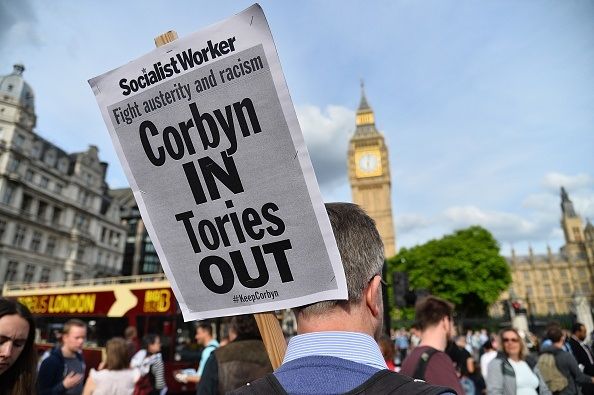
The UK has voted to leave the European Union; well, technically. In practice, the 17.5 million people voting for Brexit will have voted for many different things—not all of which are relevant to the EU. After the ascendance of post-truth politics, spurious claims about additional NHS investment and even reducing immigration are already starting to unravel.
The biggest falsehood of all was that the UK could simply choose what kind of economic relationship it would continue to have with the remaining EU, because it was in many EU members' interests to keep trading with the UK. This argument was exposed as a dangerous illusion within hours of the result being announced.
For the sake of keeping the remaining 27 member states together, the UK must, and will, be punished for daring to depart. The German chancellor, Angela Merkel, has been cool-headed enough to advise caution in this regard. Ultimately she must, and will, act to protect Germany's interest in maintaining what is left of the union over the interests of a handful of German industries in selling to UK consumers.
So what, essentially, is going on? I think we need to look at the political and discursive climate in the UK within which this brand of politics came to thrive during the campaign.
Problems ignored
There are of course important issues around working-class disaffection, leading many Labour "heartlands" to reject the party's recommendation to remain. Jeremy Corbyn's hesitant leadership of the party is an issue here: most Labour voters actually appeared not to know where the party stood on the referendum.
But there are clearly much larger problems within working-class communities which manifest on this occasion as anxiety about immigration. The question is not really whether these groups knew what Labour's position was, but rather whether they cared.
The EU referendum debate largely ignored them. It was conducted among elites—just as the decision to hold it made by the prime minister, David Cameron, was based solely on the hope of curbing discontent within his own party.
This is the same governing elite that, for the past six years, has sought sustenance in the notion of "austerity". The idea has legitimised the resurrection of the UK's pre-crisis economic growth model, but also served as a narrative around which the Conservative Party—increasingly fractured as stuttering growth pits elite interests against each other—has been able to cohere.
Personal responsibility
As I argue in Austerity Politics and UK Economic Policy, however, austerity has been much misunderstood. The dogma's prescription of fiscal conservatism is secondary to the more pressing priority of instilling personal responsibility for economic well-being among individuals.
The focus on personal responsibility serves to legitimise the idea of the market as the core organising principle of the economy. The champions of austerity are not anti-government spending, they are anti-government, period. This sentiment underpins the conservative ideological tradition, and actually helps to explain both europhilia and europhobia within the Conservative Party.
Margaret Thatcher's love-hate relationship with the EU demonstrates this well. She was instrumental in securing and defending the UK's membership of the European Community in the mid-1970s—and then as prime minister in the development of the single market. Yet she despised the development of pan-European governance mechanisms, arguing in her infamous Bruges speech in 1988 that:
We have not successfully rolled back the frontiers of the state in Britain, only to see them reimposed at a European level, with a European super-state exercising a new dominance from Brussels.
The same attitude was found in the pre-referendum debate. Leading conservative writer, and avowed europhile, Fraser Nelson decided to advocate leaving the EU because "the behaviour of the EU itself" had undermined his support for "the overall goal of unity". He wrote "with sadness":
Just as you can love Britain while deploring its government, it's never hard to distinguish between Europeans and the bureaucracy in Brussels.
Authors of their own downfall
The problem with anti-government ideology is that it is undermined when the private economy fails to deliver the wealth promised by its adherents. This was the dilemma faced by David Cameron and his chancellor of the exchequer, George Osborne, in advance of the 2015 election. Although the EU referendum was to some extent forced on them by Conservative backbenchers, Cameron and Osborne saw it as an opportunity to move away from austerity politics.
By sharing the stage with Labour in support of the EU, they could renew their governing mission as an essentially centrist project. They could marginalise the extreme advocates of austerity within their own party by silencing for a generation the totemic din around the UK's EU membership.
But Cameron and Osborne are the authors of their own downfall. Having promised that austerity would precede a new era of prosperity which never materialised, they encouraged Labour to lurch to the left. Labour members and supporters unwittingly selected the euroskeptic Corbyn as leader, having seemingly discounted the possibility that the fledgling Leave campaign could muster a winning coalition.
Corbyn accordingly played a limited role in the Remain campaign and refused to share a platform with Cameron at any point. A less favourable interpretation is that he deliberately sabotaged it. This left Cameron and Osborne dependent on a demoralised and discredited Labour "mainstream", who managed to do little more than parrot the Conservative leadership's own uninspiring rhetoric on the downsides of trade tariffs.
Initiative seized
Far more importantly, however, austerity allowed europhobes within the Conservative Party to seize the initiative. It validated their main gripe against the EU—that is, that it represents a meddlesome, continental-style approach to governing the market economy.
But for all the fantastical talk of "taking back control", the victory for the Leave campaign has empowered those opposed to the very idea that citizens may act collectively and democratically via the state to shape the economy.
Many working-class voters trusted them because their trust in the ideals of government have been eroded by decades of being told that government cannot help them—an attitude which the Remain campaign did not challenge. People were not voting against immigration, so much as they were voting against the idea that government can do anything about it.
Brexit is an amplified, hubristic version of austerity, insofar as it further weakens the role and idea of government. For many on the left, this is understandably the cause of much despair.
Capitalism ultimately needs strong government. Brexit will backfire not simply because the UK depends on trade with the EU, but also because a Brexiteer government will neglect to seriously reform the flawed UK growth model. If Labour can somehow find its voice, an opportunity to capitalise will come.
Craig Berry, Deputy Director, Sheffield Political Economy Research Institute (SPERI), University of Sheffield
This article was originally published on The Conversation. Read the original article.
Uncommon Knowledge
Newsweek is committed to challenging conventional wisdom and finding connections in the search for common ground.
Newsweek is committed to challenging conventional wisdom and finding connections in the search for common ground.
About the writer
To read how Newsweek uses AI as a newsroom tool, Click here.








